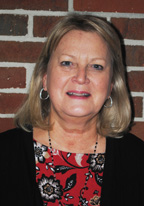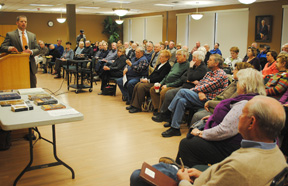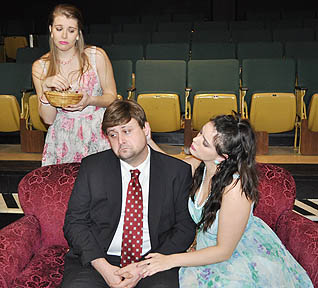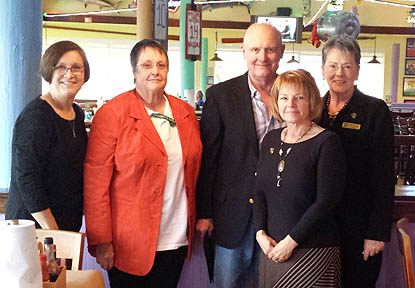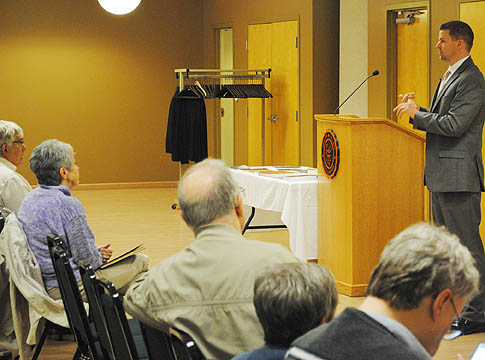
The annual Theologian-in-Residence lecture series at Tusculum College concluded Tuesday with a presentation by featured speaker Dr. Travis Williams about what scriptures were authoritative for the authors of the Dead Sea Scrolls and how they viewed prophecy.
The texts that the authors of the Dead Sea Scrolls considered authoritative, their interpretation of Biblical texts and their view of prophecy were the focus of the concluding session Tuesday of the 2016 Theologian-in-Residence lecture series at Tusculum College.
Dr. Travis Williams, assistant professor of religion at Tusculum, has presented lectures on the Dead Sea Scrolls and the Bible as part of the annual lecture series sponsored by Tusculum College and partially funded by Ron Smith.
The Essenes, a sectarian Jewish sect that a majority of scholars believe were the authors of the texts found in the Dead Sea Scrolls found at Qumran, were strict in their laws regarding ritual purity as indicated in the scroll texts.
“At Qumran, the importance placed on purity was not about cleanliness,” Dr. Williams said. “What is at issue in the Biblical purity laws … is to show that the Jewish people shunned death and clung to life.”
For the Jews, purity kept them connected with God and allowed them to harness God’s holiness and power, he explained. On the other hand, becoming ritually impure put them in danger of God leaving them or even death, as God’s punishment for remaining in an impure state.
However, for the Essenes, the importance to stay ritually pure was also related to their view of prophecy and their connection to God. The Essenes believed that as a group, they had an intimate communion with God and that angels from heaven would come down from heaven to participate in their worship services, Dr. Williams said. One of the texts found in the Dead Sea Scrolls contains a series of hymns and liturgies the Essenes believed were used by the angels in heaven.
Since the Essenes believed that the angels were worshipping with them, who worshipped with them were of high importance and no one who was impure could be in the community, he continued.
The strict purity laws also reflected the Essenes’ desire to be able to remain connected to God so they could receive divine revelation on how to interpret scripture.
The classical view of prophecy by the Jews involved a direct reception of a divine message by a prophet who then communicated it orally to people, and some Jewish groups believed that prophetic activity came to an end during the Persian period.
However, Dr. Williams explained, the Dead Sea Scrolls revealed that the Essenes held a different view, not unlike what many of the early Christians also held. The Essenes believed that prophets received a divine message through an inspired interpretation of prophetic scripture that relates in some way to the contemporary audience of the time.
“The inspired interpreter is not telling you he has a correct understanding,” he said. “The interpreter is giving you the true meaning of the ancient prophecies, what God meant is what is important.”
At Qumran, the Essenes developed a unique form of commentary on the Scriptures, known as Pesharim. These are scriptural commentaries on books of the Bible in which the true meaning of the passage is understood to speak to present day conditions rather the original historical situation.
In this view, he said, the Essenes assumed that the original prophet was used by God to write down the message but did not understand its meaning and that a modern, inspired interpreter was needed to reveal what it was about and the application to be made in the lives of people of the time.
This view of prophecy has provided a unique insight in how scripture was interpreted during the time of Christ, Dr. Williams continued, and how early Christians interpreted scripture, which can be seen in the New Testament in the references to interpretations of prophecies in the Old Testament.
During the session, Dr. Williams also examined what texts seemed to be authoritative for the Essenes. He noted that a large number of books existed in the ancient world, which were not included in the modern Jewish canon.
The Dead Sea Scrolls revealed that during the time of Jesus, there were no hard and fast lines to say what book was in or out of the Jewish canon, Dr. Williams said.
The scriptures that appeared to be authoritative for the Essenes, differed from the books that held authority for the other Jewish sects, such as the Pharisees and Sadducees, whose authoritative texts also differed.
Dr. Williams noted that a book form of the Bible became popular in early Christianity as it was easier to reference than scrolls.
Since the Jews did not have their scriptures in a book form there was not a reason to decide which texts to include in their canon.
Looking at the scrolls found at Qumran, it appears that the most important books for the Essenes were some that are in modern Old Testaments, such as Genesis, Psalms, Deuteronomy and Isaiah, but others that are not such as Jubilees, I Enoch, the Temple Scroll and the Pesharim.
On the second tier where such books as Joshua, Proverbs, Ezra, Psalm 151, I and II Samuel, Tobit, Sirach and Testament 12, and the third tier were such books as Esther and I-II Maccabees.
The Essenes appeared to have ascribed authority to a book depending on what extent it aligned to the group’s beliefs and practices, Dr. Williams said. For example, the book of Jubilees, which set out a solar calendar for the Jews, which the Essenes used, was important to them. The majority of Jews followed a lunar calendar.





